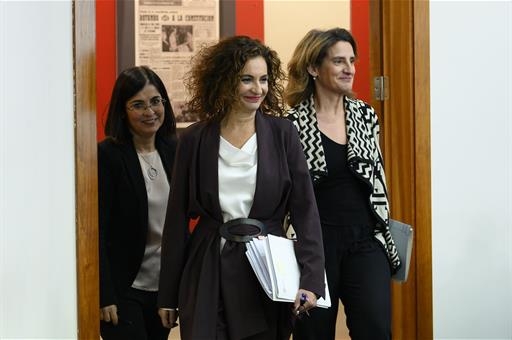Council of Ministers
Government approves 2% pay rise for public servants
Council of Ministers - 2020.1.21
Moncloa Palace, Madrid
The Council of Ministers approved a Royal Decree-Law on increased remuneration in the public sector in 2020, thus complying with the agreements reached with the trade unions.
The Minister for Territorial Policy and Public Function, Carolina Darias, argued that the adoption of this measure was a priority for the President of the Government, Pedro Sánchez. "This shows a clear commitment from the government to recover the rights of public workers after a long period of cuts, and very low replacement rates".
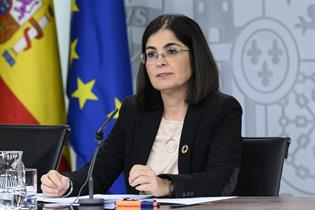 Pool Moncloa/Borja Puig de la BellacasaCarolina Darias explained that a fixed increase of 2% is established in the remuneration of public servants, with retroactive effects to 1 January, as well as a variable increase linked to the growth of the Gross Domestic Product for 2019. Aside from these amounts, a 0.3% increase in the total payroll may be authorised through additional funds to implement plans or projects to improve productivity, following a collective bargaining agreement.
Pool Moncloa/Borja Puig de la BellacasaCarolina Darias explained that a fixed increase of 2% is established in the remuneration of public servants, with retroactive effects to 1 January, as well as a variable increase linked to the growth of the Gross Domestic Product for 2019. Aside from these amounts, a 0.3% increase in the total payroll may be authorised through additional funds to implement plans or projects to improve productivity, following a collective bargaining agreement.
The pay rise will be applied to some 2.5 million public servants in all three tiers of government (central, regional and local) and in the public business sector, specified the minister, who also acknowledged the dedication, hard work and commitment of this group.
Carolina Darias recalled that the adoption of this agreement was not legally possible until the new government was formed, which has now implemented it as quickly as possible.
Declaration of Climate Emergency
The Council of Ministers approved the Declaration of Climate Emergency, a document with 30 lines of priority action to fight climate change and safeguard the environment, the health and the security of citizens.
The Fourth Vice-President of the Government and Minister for the Ecological Transition and Demographic Challenge, Teresa Ribera, pointed out that the current risks deriving from the impact of climate change are already considered to be highly important from the perspective of the global economy - as evidenced in this year's report from the World Economic Form - as well as socially, because they lead to "suffering and inequality".
In this regard, the Fourth Vice-President of the Government advocated the need to push through this Declaration on grounds of justice "between countries and regions, between generations and between people with unequal resources to tackle climate change", in the interests of the future, "to invest in a viable project of an inclusive society", and out of a sense of responsibility, since "not addressing this challenge is regressive from a social point of view and economically and socially expensive".
Teresa Ribera claimed that the Declaration "should inspire public policies" and allow the government to develop its commitment to the fight against climate change much more profoundly, quickly and with greater ambition, pooling the efforts of all public authorities. "As institutions, we shoulder a responsibility to avoid increasing problems and to facilitate solutions".
Five measures in the first 100 days of government
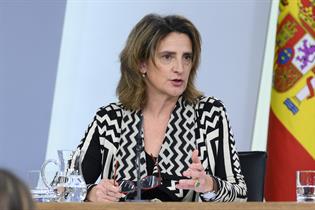 Pool Moncloa/Borja Puig de la BellacasaTeresa Ribera explained that the government undertakes to implement five specific measures in the first 100 days of government in the Declaration of Climate Emergency.
Pool Moncloa/Borja Puig de la BellacasaTeresa Ribera explained that the government undertakes to implement five specific measures in the first 100 days of government in the Declaration of Climate Emergency.
The first is to present Parliament with the Draft Climate Change and Energy Transition Act, which seeks to guarantee the obligation to reduce greenhouse gas emissions to achieve climate neutrality by the year 2050.
The presentation of the second National Plan to Adapt to Climate Change, the definition of the path of decarbonisation in the long term, and boosting productive sectors to foster their sustainability and create quality jobs, are the other three short-term measures.
The fifth measure is the creation of a Citizen Assembly for Climate Change, which allows citizens to take part in the decision-making process on this matter. Teresa Ribera announced that its composition will be inclusive, gender balanced and "with special representation from young people".
25 cross-cutting action lines
Among the 25 remaining measures that will shape the actions of the government and of public authorities in the rest of the legislature and which will have a cross-cutting effect on all sectors of activity, Teresa Ribera specified the National Action Plan for Sustainable Finance and a programme to issue green bonds by the Public Treasury, the Action Plan on Environmental Education for Sustainability and the National Health and Environment Plan.
Furthermore, the Strategy to Protect the Spanish Coastline will be presented before 2021 and several draft laws, including the Draft Law on Waste and the Draft Law on Sustainable Mobility and Public Transport Financing will be presented, with such initiatives as ensuring that towns and cities with more than 50,000 inhabitants establish low emission zones.
Payments on account to regional and local authorities
The Council of Ministers decided on the criteria to apply a budgetary extension in the distribution of the payments on account to regional governments and local authorities corresponding to 2020.
The Minister for the Treasury and Government Spokesperson, María Jesús Montero, reported that the regional governments will receive 103 billion euros by way of payments on account, which is a 5% increase on the figure initially notified in 2019. This amount will be updated when the forecast revenue for the year becomes known within the framework of the process to draw up the National Budget. These advance payments will start to paid out to the regional governments in the coming days.
According to María Jesús Montero, the initiative approved is very important for strengthening the regional model and the social State and clearly reflects the government's commitment to financing regional bodies. In this regard, she highlighted that even in a situation of a budget extension, the government tries to ensure that key public services can benefit from economic growth".
National Budget 2020, in the summer
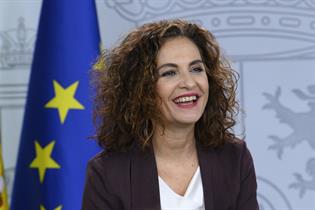 Pool Moncloa/Borja Puig de la BellacasaThe Minister for the Treasury explained that the government expects the National Budget to be approved in the summer. The procedure was set in motion on Tuesday with the publication in the Official State Gazette of the Order establishing the rules for its drafting and for each ministerial department to present its respective accounts.
Pool Moncloa/Borja Puig de la BellacasaThe Minister for the Treasury explained that the government expects the National Budget to be approved in the summer. The procedure was set in motion on Tuesday with the publication in the Official State Gazette of the Order establishing the rules for its drafting and for each ministerial department to present its respective accounts.
María Jesús Montero stated that the priorities, at any event, will be to promote inclusive economic growth based on innovation, technology and digitalisation; to commit to a just ecological transformation; to defend social rights; to foster territorial cohesion to address, among other matters, the demographic challenge, and the fight for equality. As regards the last aspect, the Government Spokesperson announced that the Budget will contain, for the first time, a diagnosis of the gender reality in Spanish society.
Before presenting the Draft National Budget to the Lower House, María Jesús Montero announced that an agreement should be reached with Brussels on the deficit path and trusted that some flexibility will be applied to the current path, which dates back to 2018 and which "is not in line with the daily reality". Furthermore, Parliament must approve the ceiling on spending and the stability path prior to debating and approving the Budget.
Restoration of forest infrastructures
The government ratified emergency actions to restore forest infrastructures in the provinces of Valencia and Alicante to alleviate the damage caused by the Cold Snap (Spanish acronym: DANA) that affected Spain between 9 and 14 September 2019.
The works will involve a total investment of 3 million euros and respond to the aid procedure granted by the State to address this type of situation.
Other agreements
The Council of Ministers authorised a framework agreement for the sum of 14 million euros to select the company to provide the services to manage Child Education Centres of the Ministry of Defence.
It also agreed to withdraw the appeal lodged as unconstitutional against the Law on Local Authority Associations of the Regional Government of Valencia, after a negotiation process that has led to the amendment of some of the more controversial issues contained in the law. The government also backed the lodging of an appeal against the unconstitutional nature of the Law on Agri-food Quality of the Regional Government of the Canary Islands.
Furthermore, the government granted Spanish nationality to the water polo player of Czech origin, Martin Famera, and to the boxer born in Cuba, Enmanuel Reyes Pla.
Current affairs
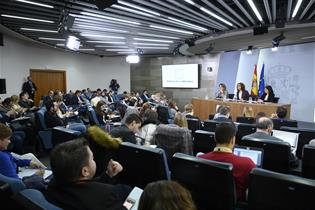 Pool Moncloa/Borja Puig de la BellacasaThe Government Spokesperson announced that all the government ministers have requested to appear in the Lower House to outline their programme and submit to parliamentary scrutiny. "We want to return the confidence to our citizens in public institutions and legitimise them constantly".
Pool Moncloa/Borja Puig de la BellacasaThe Government Spokesperson announced that all the government ministers have requested to appear in the Lower House to outline their programme and submit to parliamentary scrutiny. "We want to return the confidence to our citizens in public institutions and legitimise them constantly".
María Jesús Montero also referred to the agenda of the President of the Government, Pedro Sánchez, who will take part on Tuesday and Wednesday in the World Economic Forum to be held in Davos (Switzerland), accompanied by the Third and Fourth Vice-Presidents of the Government, Nadia Calviño and Teresa Ribera.
Pedro Sánchez will also attend the Cinema Academy's award ceremony of the Goya Prizes to provide express support to the film industry, "which is fundamental for spreading our culture and as a driver of economic growth", said María Jesús Montero.
Non official translation





